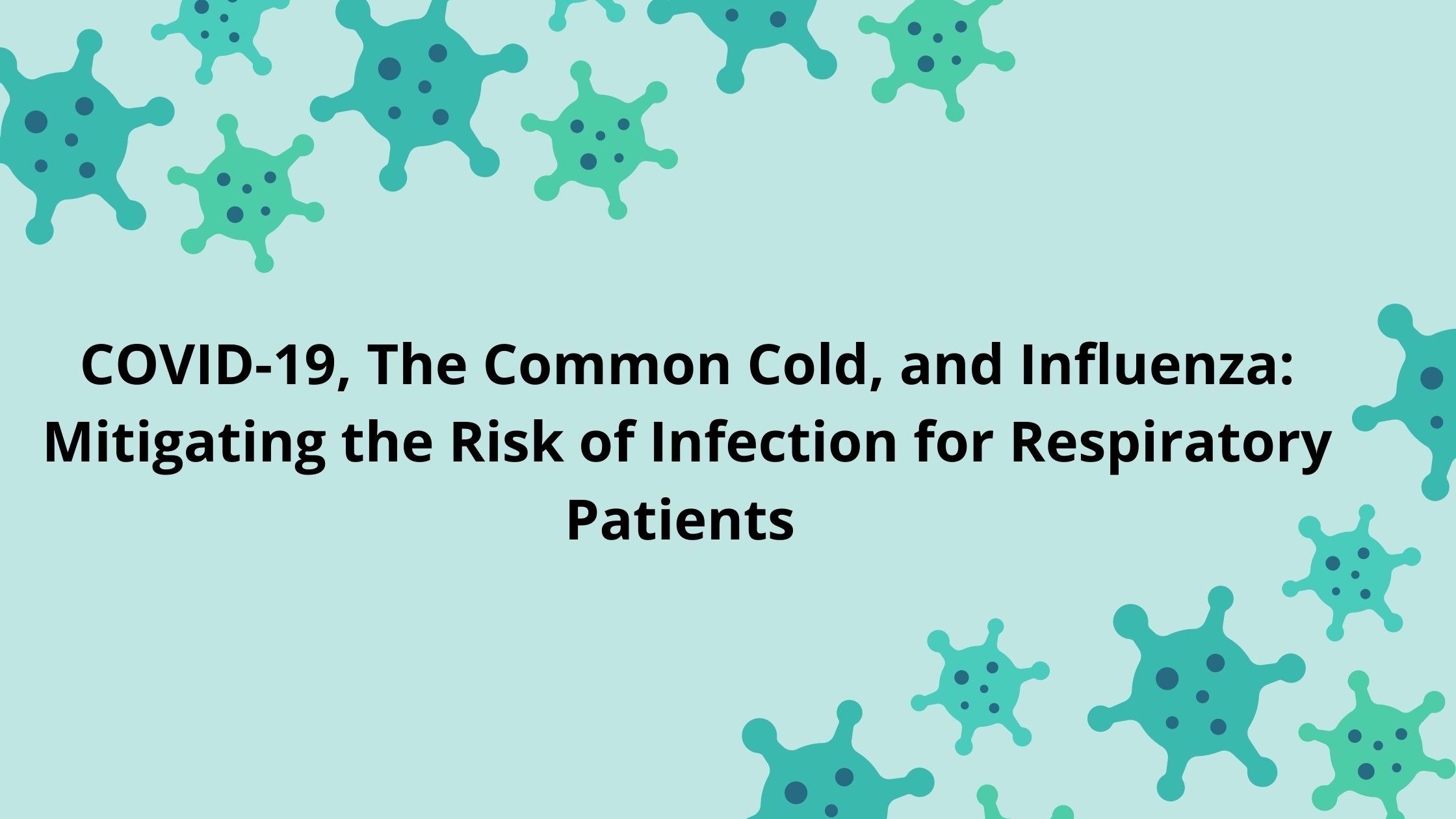
First and foremost, we want to preface this article by saying that within the global reality as it stands now, we highly recommend checking in with your primary care physician or a medical expert in your corner when dealing with potential ailments, especially if you have a condition that would exacerbate your symptoms if you were to be exposed to the Coronavirus causing COVID-19, influenza, or the common cold.
The current state of the global pandemic is still unfolding, and rapidly changing. Definitive information is not readily available, nor are there answers to the burning questions we all have. The fact of the matter is that we are all learning how to mitigate risk, safely operate within some capacity of our normal lives, and keep ourselves and the ones around us safe.
In this article, we first want to elaborate on the importance of staying healthy if you have a chronic illness, such as chronic obstructive pulmonary disease. Secondly, this article is a glimpse into the differences and similarities between COVID-19, influenza or the common flu, and the common cold.
How to Mitigate your Risk of Infection

If you are a COPD patient and/or a long term oxygen therapy patient, protecting yourself from viruses and bacterial infections is a critical course of action you must take everyday. Outside of the global pandemic, infection and weakened immune systems are ways that respiratory patients find themselves in critical conditions and often hospitalized. Infections of any kind are something that you should try to avoid at all costs because these are life threatening situations.
Even though chronically ill people are not more susceptible to catching the Coronavirus, contracting COVID-19 imposes much higher risks than if a healthy person was to contract the virus.
There are a lot of ways to avoid getting sick during flu season and there are a lot of ways to avoid catching COVID-19, respiratory patients should be diligent to follow the CDCs recommendation, and take the precautions necessary to avoid transmission.
Follow these resource to find all of the way you can prevent getting sick:
CDC COVID-19 Prevent Getting Sick
How to Prevent the Flu: Natural Ways, After Exposure, and More
Common Colds: Protect Yourself and Others
Germs: Understand and protect against bacteria, viruses and infection
The overarching points made within all of these resources are very basic tasks and practices that you can implement into your daily life in order to protect yourself and others.
These include, washing your hands frequently, disinfecting frequently touched surfaces in you vehicle and home, avoiding people outside of your quarantine bubble, staying a minimum of 6-feet away from people when in public spaces, wearing a double layered masks when in public spaces, avoid itching your eyes, nose, and mouth, avoid traveling far distances, avoid touching people, interact less with people in person and more so virtually, do not spend time in enclosed spaces with other people.
Social distancing, wearing a mask, and disinfecting your hands and surfaces are the most effective ways to avoid catching any ailment whether that's the common cold or COVID-19.
The Common Cold

Having a cold is never a fun experience, and while you may feel horrible when you have a cold, it feels generally less intense than having a more severe virus like the flu.
Cold symptoms can include any of the following:
- Runny or stuffy nose
- Cough (mild)
- Fatigue (sometimes)
- Sneezing
- Watery eyes
- Sore throat
- Headaches (rarely)
- Aches and pains
If you are looking to treat your cold symptoms, and over the counter medication can help, but will not have lasting impacts, and the best course of action is to rest and wait. A typical cold will last on average up to 7 to 10 days.
The Common Flu (Influenza)

The seasonal flu rapidly and effectively infects people every year and is vital for a long time out of the year from around the beginning of Fall through all of the winter and even spring sometimes. It’s a common virus causing respiratory infection so it affects your nose, throat, and lungs and can last from 5 to 7 days.
Here’s are some common symptoms of the flu:
- Fever and/or chills
- Cough (usually dry)
- Fatigue
- Aches and pains
- Runny or stuffy nose (sometimes)
- Sore throat (sometimes)
- Diarrhea (sometimes in children)
Unlike a cold, you can get vaccinated in order to prevent the flu. If you are hesitant to get the flu vaccine, be aware that if you do get a flu shot and still get the flu, the symptoms you experience will be milder than if you didn’t receive the flu shot. Medical treatment for the flu is uncommon for most people, but if you have COPD or another chronic respiratory disease, the flu can cause more issues where medical treatment may be necessary. It is important to stay home, rest, and get plenty of fluids. If you have a fever, that can be treated with Tylenol or Ibuprofen.
COVID-19

Coronavirus causing COVID-19 is a new virus that has spread quickly worldwide. There are other strains of coronavirus which are very common and usually only cause mild symptoms similar to a common cold. COVID-19 on the other hand, causes much more severe illness in certain groups. People who are at risk of developing serious COVID-19 symptoms include older people and people of all ages with severe underlying health conditions like heart disease, lung disease, and diabetes.
Covid-19 Vaccines: Pfizer, Moderna, and Johnson & Johnson

There are now two COVID-19 vaccines and very soon there will be three readily available in the United States, they are Pfizer, Moderna, and Johnson & Johnson. You only need one of the vaccines, and you will need two doses if you get the Pifizer or Moderna, but the Johnson & Johnson vaccine only requires one dose, each vaccine will protect you against the COVID-19 virus. They all have been shown to be highly effective at preventing COVID-19 Learn more about the different COVID-19 vaccines by following this link.
Once you get the vaccine it is still highly recommended to wear a mask in public places, social distance, and continue washing your hands and disinfecting the surface, because It’s not yet known if any of these vaccines prevent asymptomatic infection, meaning you could still potentially catch COVID-19 and simply not experience symptoms in which case you could be unknowingly be transmitting the disease to others not yet vaccinated. Still, it is not known for sure if vaccinated people can transmit the virus if they do become infected but don’t show symptoms, so it is best to be safe and continue mitigating any risk of spreading COVID-19.
Symptoms of COVID-19 can include:
- Fever and/or chills
- Cough (usually dry)
- Shortness of breath or difficulty breathing
- Tiredness (sometimes)
- Aches and pains (sometimes)
- Headaches (sometimes)
- Sore throat (sometimes)
- *Upper respiratory symptoms, like runny nose and sinus congestion, are very uncommon in COVID-19.
The severity of COVID-19 symptoms ranges from mild to severe. If your symptoms are mild you will likely be directed to stay home to protect others from illness and follow the CDC’s recommended guidance for self-care. If you’re referred to a testing site or medical facility, remember to call ahead and let them know your symptoms before you go in.
Vaccines and What People with Lung Disease Need to Know

If you have asthma or COPD, your risk for experiencing serious problems from certain vaccine-preventable diseases is much higher than the average person. Therefore, getting vaccinated is an important thing you must do to stay healthy.
Respiratory diseases can impact your system in a number of ways depending on your condition. Conditions like COPD or asthma block your airways with excess mucus and cause your airways to swell, making it very difficult to breath and get the right amount of oxygen.
There are diseases that cause excess swelling to your airways and lungs that can be prevented by a vaccine, and therefore, it is crucial for respiratory patients to get these vaccines. If you do get ill on top of your COPD or other respiratory disease, the combination of the two can lead to pneumonia and other serious respiratory illnesses and progression of your disease into a more severe state.
Vaccines are one of the safest ways for you to protect your health, even if you are taking prescription medications. Vaccine side effects are usually mild and go away on their own. Severe side effects are very rare.
COVID-19 Vaccine and Respiratory Patients

All of the current COVID-19 vaccines are tested, analyzed, and meet strict criteria set up by the U.S. Food and Drug Administration, so the COVID-19 vaccines meet strict standards of safety, quality and effectiveness. When you get a COVID-19 vaccine, it will be highly effective and will protect you from coronavirus and save lives
If you have COPD, or any other respiratory illness protecting yourself from COVID-19 is very essential to your health, both in the short and long term. If you have a respiratory disease, you are at risk of experiencing worse symptoms and are at higher risk of being hospitalized for those symptoms.
COVID-19 is not going away, and the vaccine is one of the best ways to mitigate your risk of infection.
Overview
Getting sick is never fun, and as a respiratory patient getting sick is actually very harmful to your system and the condition that you already have can be exacerbated.
Mitigate your risk of experiencing any worsening symptoms by following COVID-19 regulations and getting the vaccine when you are able to. It would be wise to reach out to your doctor and talk to them about the vaccine process, they will assure you whether or not it is prudent of you to get the vaccine based on your individual health standards.
You should also be diligent to avoid common sickness such as influenza or a common cold, both of these illnesses can also negatively impact your health.


.png)





